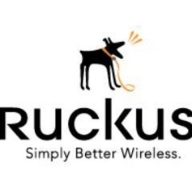

Aruba Wireless and Ruckus Wireless compete in the wireless network solutions category, with Aruba gaining an edge due to its robust security features.
Features: Aruba Wireless offers a robust security suite with an integrated firewall, ClearPass Access Management, and wireless intrusion protection. Its AppRF, AirWave monitoring tool, and Adaptive Radio Management are significant innovations. Ruckus Wireless is known for its BeamFlex adaptive antenna technology, superior coverage, and seamless connectivity, providing users with reliability and durability.
Room for Improvement: Aruba Wireless could enhance stability in newer versions and improve ClearPass documentation. Users also seek more competitive pricing and simpler licensing models. Ruckus Wireless may benefit from enhanced cloud-based management tools and more affordable pricing, as current costs are viewed as high by some users.
Ease of Deployment and Customer Service: Both Aruba and Ruckus offer diverse deployment options, including on-premises and cloud. Aruba gets mixed reviews on technical support, with some users noting extended resolution times. Ruckus, on the other hand, receives positive feedback for ease of use and generally satisfactory customer support, though direct technical support interactions could be improved.
Pricing and ROI: Aruba Wireless provides competitive pricing with a one-time perpetual licensing model, making it appealing for its lower long-term costs, though additional support and cloud options can be pricey. Ruckus Wireless, while perceived as expensive, justifies its cost through performance and a lower total number of required access points, offering an effective solution for high-density environments. Both solutions reportedly deliver positive ROI, contributing to time savings and operational efficiency.
There is no need to buy additional controllers for managing access points.
There are significant time savings, around thirty to forty percent, due to minimal disconnections.
I believe that in the coming years, it would be real value for the money.
I only needed support once or twice for a replacement, and it was handled smoothly without any difficulty.
I would rate their technical support nine out of ten.
The customer support is good.
I have contacted Ruckus support through our managed services vendor, but the responses have been delayed, possibly due to the vendor.
I have communicated with Ruckus Wireless technical support directly for all technical issues.
The solution is scalable, as multiple sites connect seamlessly.
It is easy to adapt and very scalable.
With the Ruckus R1 Cloud, I just need to put it into the venue, and it will automatically sync up and configure itself.
I have been using the product for the last nine years without facing any issues post-installation.
I don't remember it going down during the years it existed.
Aruba Wireless is stable.
The product should be more affordable, especially the cloud and console for the Aruba product as it is currently very expensive.
While the technical specifications are satisfactory, the access points are expensive.
At the time of purchase, the prices were moderate, but now they are quite expensive.
The current reporting is limited to 30 days, and it would be helpful if there was an option to extend it to one year.
Sometimes when there's a load of work, even within the range of the concurrent users, we feel that the system is burdened and slows down.
The pricing seems reasonable compared to other brands; however, it is too expensive for smaller businesses.
The pricing can be expensive.
The initial prices were more affordable compared to the current high prices.
Ruckus Wireless is quite economical compared to Meraki or Cisco Umbrella APs.
Regarding the pricing and licensing of Ruckus Wireless, it's a bit expensive compared to other solutions available in Pakistan.
I do not need to buy a controller for the access point since the Aruba Access Point has a built-in virtual controller.
The Aruba Wireless solution has excellent roaming capabilities, ensuring seamless connectivity.
It has many features and is integrated with Azure AD and multiple active directories, making authentication easy.
The most valuable feature of Ruckus Wireless is its AI capability, which automatically scales up and down the coverage areas.
Overall, we have fewer issues using these devices, and it's more stable.
| Product | Market Share (%) |
|---|---|
| Aruba Wireless | 13.9% |
| Ruckus Wireless | 12.8% |
| Other | 73.3% |


| Company Size | Count |
|---|---|
| Small Business | 77 |
| Midsize Enterprise | 47 |
| Large Enterprise | 74 |
| Company Size | Count |
|---|---|
| Small Business | 69 |
| Midsize Enterprise | 21 |
| Large Enterprise | 26 |
Aruba Wireless is a secure, high-performance, multi-user wireless LAN supporting Wi-Fi 6. As workplaces and user expectations change, users can now maintain hybrid workplaces and IoT without compromising performance, reliability, or security. Aruba Wireless delivers better performance and capacity and greater AIOps visibility throughout all devices and users. In addition, through built-in network intelligence, network operations are made simpler while keeping everything secure through user and guest encryption.
Aruba Wireless, offered through Aruba Networks, is helping achieve digital transformation and IoT with seamless connectivity through multiple Wi-Fi access points. For the user’s convenience, Aruba Wireless provides indoor, outdoor, and remote access points to help boost faster and safer connectivity.
Choosing Aruba Wireless can help improve your organization’s user experience with wireless LAN in many ways, including:
Aruba Gateways and Controllers
Small organizations as well as large enterprises require excellent performance and security for cloud, mobility, and digital transformation. Therefore, in addition to the access points, Aruba Wireless also offers a variety of gateways and controllers, including:
Reviews from Real Users
Aruba Networks is aiding organizations in transforming to a hybrid work environment with Aruba Wireless. Users especially love its ability to work with many devices and its ability to group and manage access points.
A senior IT solutions architect at a manufacturing company says, "The most valuable feature is the fact that it can work with many devices. It supports everything that we need it to."
Gary F., a network administrator at wireless at Abilene Christian, notes, "I like the way it groups and manages access points."
Ruckus Wireless is part of Ruckus Networks/Commscope and provides reliable wireless network solutions and services to large venues, schools, hotels, hospitals, malls, and public spaces (and more) worldwide.
Wireless access is an integral necessary part of today’s modern, fast-paced lifestyle. It is essential that dependable, safe wireless capabilities be available in most of today’s largely populated public spaces. Ruckus Wireless is the trusted industry leader in assisting organizations of all sizes to provide wireless access throughout their locations, both inside their physical structures and adjacent open outdoor areas.
Ruckus Wireless empowers users to design and create a wireless network across their organizational space to ensure that wireless coverage is available consistently to anyone who needs it. Ruckus can handle anything from homes and small to medium-sized businesses to hospitals, college campuses, airports, malls, stadiums and more. Ruckus also has excellent options for outdoor wireless networks. Many users choose Ruckus Wireless for broad extensive outdoor use. The solution offers excellent durable outdoor access points and a very robust, super fast, reliable Wi-Fi. Each and every access point is very powerful, and the outdoor access points can be very easily disguised to keep the network secure.
Another strong point is that Ruckus technology is based on frequencies. If there is ever any type of wireless interference, Ruckus Wireless can change frequency automatically so there are never any interruptions. Users also have the option to block outside access points and signals that may interfere with their network and make their network the only one that people can see within the network. Users can additionally whitelist certain networks if desired.
Ruckus uses the latest next-gen Wi-Fi, Wi-Fi 6, ensuring that more devices can be handled with greater speed and continuity. With Ruckus, users have great control over network traffic. They can also allocate the amount of bandwidth network users are granted based on their status - eg., guest, corporate, etc. - and give users priority on the network based on their status. Ruckus also has mesh and beamforming capabilities, which are recognized as a valued feature for many users.
Ruckus Wireless is robust, extremely reliable, very easy to deploy, and offers amazing coverage and rock solid connectivity. It is very easy to add additional access points across the network. Ruckus Wireless is very easy to use and manage using an app on any mobile device.
Reviews from Real Users
A Director Engineering & New Business at a comms service provider says Ruckus “provides superior coverage and is very dependable”
Sintayehu A., Director Of Information Communication Technology at Dire Dawa University, relates that "Ruckus Wireless supports the most recent technologies. We can trace every individual and what kind of traffic they're using on our campus. It is very helpful."
Philip S., Independent Consultant - Wireless, says, "The solution is very stable. I've worked with it at a hospital before, where we deployed it all over the hospital. It worked everywhere and continuously worked flawlessly."
We monitor all Wireless LAN reviews to prevent fraudulent reviews and keep review quality high. We do not post reviews by company employees or direct competitors. We validate each review for authenticity via cross-reference with LinkedIn, and personal follow-up with the reviewer when necessary.